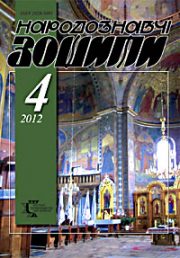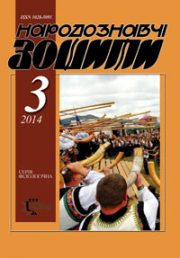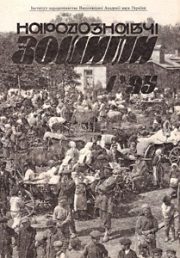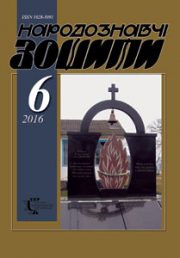The Ethnology Notebooks. 2019, № 4 (148), 934—943
УДК 398-051(477)”183/192″О.ЛОНАЧЕВСЬКИЙ-ПЕТРУНЯКА:[801.81:398.8(=161.2)]
DOI https://doi.org/10.15407/nz2019.04.934
PUBLICMAN OLEKSANDR LONACHEVSKIY-PETRUNYAKA IS IN HISTORY OF UKRAINIAN SPECIALIST IN FOLK-LORE
KOZAR Lidia
ORCID ID: https://orcid.org/0000-0003-2997-6106
Candidate of Philological Sciences,
a senior researcher Institute of Art Studies,
Folklore Studies and Ethnology M.T. Rylsky
National Academy of Sciences of Ukraine,
department of the Ukrainian and foreign specialist in folklore,
4, st. Mikhail Hrushevsky, 01011, Kiеv, Ukraine.
Contacts: e-mail: kozarli@ukr.net
Abstract. The article is devoted to the little-known and little-studied figure of the Kiev public, philologist, teacher, folklorist and publicist Alexander Lonachevsky-Petrunyatsi. The purpose of the article is to cover his folklore-ethnographic activities. The works of A. Pypin, I. Zhitetsky, M. Bilinsky, A. Kozyrev, N. Pobirchenko, devoted to the figure of A. Lonachevsky-Petrunyaka are considered. The relevance of the article is determined by the presence of a new source base which made it possible for the first time to establish the date of the death of the folklorist, as well as to analyze his archived song records. The chronological framework of the study is the second half of the XIX – the beginning of the XX century, where Alexander Lonachevsky is presented as a Ukrainian public figure and folklorist in the context of the national revival of that time. Based on the research, the following tasks are set: to define the original part of his archived song recordings, which highlights the political life of the Ukrainian people: these are historical, сossack, recruit, burlak and zarobitchansky songs, most of which have not been published yet; explore his relationship with Drahomanov based on their correspondence and other archival materials. Epistolary controversy of A. Lonachevsky with M. Dragomanov helps to reveal their characters, views on Ukraine and Ukrainians. His contribution to Ukrainian folklore is noted — a collection of Ukrainian songs (collection of «Love Songs», 1864; arranged by the ethnographer D. Lavrenko) and fairy tales (Collection of «Folk Southern Tales», Vol. 1—2, 1869—70; ordered I. Rudchenko), compilation of the «Collection of songs of the Bukovinian people» (1875) by G. Kupchanka. A. Lonachevsky-Petrunyaka should take a significant place in the history of Ukrainian studies, it is worth to give his archival folklore records and convey to the general public his correspondence and richness of the creative heritage, in order to bring up love for Ukraine by the example of his biography.
Keywords: Oleksander Lonachevsky-Petrunyaka, Mikhailo Dragomanov, Ukrainian folklorist, public figure, national revival, archival song recordings, historical, cossacks, recrutsky, burlatsky and zarobitchansky songs.
Received 23.05.2019
REFERENCES
Archive of Mikhailo Dragomanov (1938). Correspondence of the Kiev old community with M. Dragomanov (1870—1895) (Vol. 1, pp. 163—171). Warsawa [in Polish].
Zhitetsky, Ig. (1928). Kiev Community of the 60s. Ukraine (Part I, pp. 116—117) [in Ukrainian].
Belinsky, M. (1928). From the past experienced: 1870—1888. Ukraine (Part II, pp. 126—128) [in Ukrainian].
Kozyrev, A. Personal composition of the «committee of 12» Kiev «Old Gruppa» in 1875-1876. Retrieved from: http://lib.chdu.edu.ua/pdf/naukpraci/history/2006/62-49-4.pdf [in Ukrainian].
Pobirchenko, N. To the history of the relationship between M. Dragomanov and Kiev society in the context of the Ukrainian cultural and educational movement (second half of the XIX century). Retrieved from: http://ipa.udpu.edu.ua/article/view/15337 [in Ukrainian].
Erofeev, I. Various materials about A. Lonachevsky (notes, bibliographic extracts, etc.). Archival scientific collections of manuscripts and background recordings of the Institute of Art History, Folklore Studies and Ethnology named after M.T. Rylsky NAS of Ukraine (hereinafter — ANFRF IIPE). F. 36. Col. 1. U. hr. 38 [in Ukrainian].
A copy of the death certificate of A. Lonachevsky. ANFRF IIPE. F. 36-к. 1. U. hr. 38 [in Ukrainian].
Rudchenko, I.Ya. Collection No 1 «All kinds of things» — a manuscript book by A. Lonachevsky. Songs (without melodies), riddles, legends, ethnographic materials. From the materials of the Poltava Museum of Local Lore. 1864—1873. Manuscript. ANFRF IIPE. F. 8-к. 1. U. hr. 21. Arch. 22—37. № 45—76 [in Ukrainian].
Letter to Lonachevsky A.I. to Ya.P. Novitsky (1888). ANFRF IIPE. F. 4—3. U. hr. 84 [in Ukrainian].
Pypin, A. (1891). History of Russian Ethnography (Vol. 3, pp. 376—378) [in Russian].







